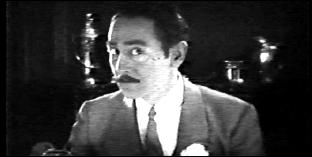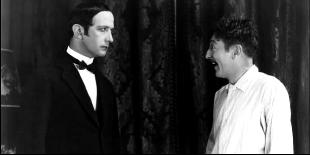Mon 31 Aug 2009
A Movie Review by Walter Albert: A GENTLEMAN OF PARIS (1927).
Posted by Steve under Films: Drama/Romance , Reviews , Silent films1 Comment
A GENTLEMAN OF PARIS. Paramount Famous Lasky Corp., 1927. Adolphe Menjou, Shirley O’Hara, Arlette Marchal, Ivy Harris, Nicholas Soussanin. Screenplay by Chandler Sprague from the story “Bellamy the Magnificent” by Roy Horniman; titles by Herman Mankiewicz; photography by Hal Rosson. Director: Harry d’Abbadie d’Arrast. Shown at Cinevent 41, Columbus OH, May 2009.
The cinematography by the noted Hal Rosson was compromised by the dark print that made some of the intertitles difficult to read.

This was also to be a problem with at least two other films, one of which was so severely damaged that the last reel was almost unwatchable. (More on this later.)
Adolphe Menjou is the dapper Marquis de Marignan whose complicated love life is managed with great skill by the apparently unflappable Joseph Talineau (Nicholas Soussanin), his butler and general manager of his household.
The arrival of the Marquis’ fiancee, Yvonne Dufour, taxes even Joseph’s talents, but all seems to be under control until Joseph learns that his wife (their marriage seems to be one largely of convenience from her point of view) is one of his employer’s conquests.
Stunned by the discovery, Joseph decides to destroy the Marquis by engineering a card game that appears to demonstrate that the Marquis is a cheat, a crime worse, in the eyes of society, than cheating with a friend’s wife. What begins as a frothy comedy of manners turns so dark that the only recourse for a gentleman is to take his own life.

The sudden reversal that undermines Joseph’s plan and restores comedic balance may satisfy some conventional sense of wanting a restoration of the “natural” order but it throws the film off balance.
Tragedy threatens and the momentary crossing of the boundary that separates comedy and tragedy in classical French theater may prove disconcerting to more than one spectator, especially since the resolution seems so hollow.
The director had worked with Chaplin on A Woman of Paris in which Menjou plays a similar role as a gentleman about town, his stock in trade as an actor in the silent era, and this film, even viewed in a dark print, is an effective exercise in style.
D’Abbadie d’Arast’s Hollywood career was apparently damaged by his reputation for being difficult and going over budget (reminding one of von Stroheim). He ended his career in 1933 with the direction of Topaze, which boasts fine performances by a cast headed by John Barrymore and Myrna Loy, closing his career with a film that played to his strengths as a director.
August 31st, 2009 at 8:54 pm
Roy Horniman, who wrote the story this was based on, also wrote the story Kind Hearts and Coronets was based on, the Brit comedy that featured Alec Guiness in multiple roles. He seems to have had a penchant for charming rogues.